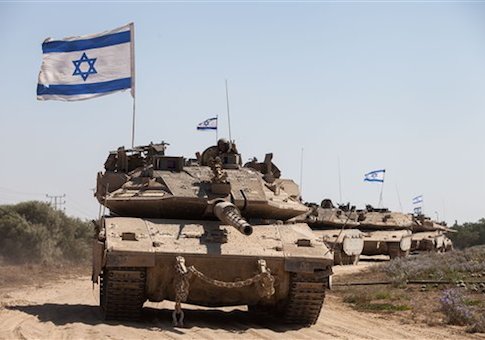JERUSALEM—For two weeks, they slept on makeshift beds in Gaza’s tunnels, living on water and dates, waiting for the order to ascend to the surface and attack advancing Israeli forces from the rear. They had been trained to wait like that for as long as a month and a half, if necessary.
This testimony from a Hamas fighter captured by Israeli troops during last month’s fighting in Gaza was described in a rare interview on YNet with soldiers from an Israeli field intelligence unit who served in the Gaza war.
One interrogator, identified only as R., said that the paratroop unit he was attached to killed three Hamas operatives emerging from a ruined building. The troops discovered a shaft just inside the building’s entrance leading down to a tunnel. A small detachment remained behind while the rest of the unit continued on. After two hours, two figures emerged from shaft and threw their weapons down, raising their hands in surrender.
"I was surprised by them," said R., who questioned the pair in a special interrogation center set up on the Israeli side of the border. "One tends to think of a terrorist as someone who is inarticulate, a fanatic, filled with hatred. But one of them turned out to be a college graduate. He was intelligent and his language was at a high level. He spouts a harsh ideology but also shows openness. I found it fascinating."
Israel took 190 prisoners during the war. A few dozen were retained after the war ended to be used in bargaining for the return of the bodies of two dead Israeli soldiers. The rest were released.
Prisoner interrogation saved many Israeli lives, R. said. "We retrieved information from them about a complex of buildings the brigade was about to enter. They told us about booby trapped entrances and bombs lining the paths around the complex. Other forces that entered such complexes elsewhere suffered heavy losses."
Another field intelligence officer accompanied a unit that spotted a Hamas crew preparing to launch a rocket into Israel. The officer pleaded with the commander not to open fire but to execute a flanking movement and capture the crew. This was done. "We got information from them about 15 launch sites, information that was immediately passed on to the air force. Within minutes, they bombed the sites. We also learned from them their method of operation—how far they position themselves from concealed launch sites, who gives the launch order and by what means—telephone or radio."
Do the interrogators use force to obtain information?
"Never," said Lt. Col. H., commander of the unit. "Force doesn’t yield information. Interrogation is an acquired skill. You need an excellent command of Arabic and of the different dialects. You need a high level of emotional intelligence and the ability to connect well with people."
R. put it in down-to-earth terms: "You’re sitting with someone who just moments before thought he was about to die. You’re his enemy. He’s confused and scared. You calm him down. It’s your job to make him go from thinking he’s about to die to thinking he’s not going to die, that the war is over for him. If you aren’t able to convey from the outset the sense that you are his friend, his father, his brother, at this moment in time, you’ll get nothing out of him. He has to be in a state of mind in which he chooses to cooperate because of the sense of security you have given him."
